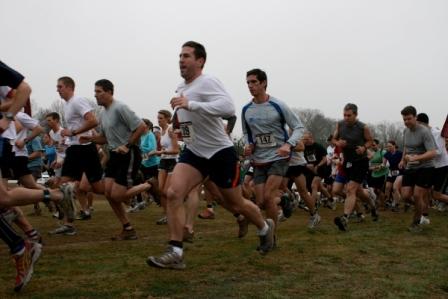For starters, he asked me why I was there. As I've written before, this was a question that I definitely expected to be asked so I had spent a little time thinking out a decent, intelligible answer. I feel called to serve and the Marine Corps appeals to me because of its strong emphasis on leadership and being the best. I've been through all of this before here so I'll leave it at that.
The next step in our conversation was for Captain Pages to get a good idea of what I was looking to do in the Marine Corps. I made it pretty clear that I wanted to go for an air contract, but if all else failed I would certainly consider ground. With the Marines, OCS candidates apply for either a ground, air, or law contract. It's reasonably self-explanatory; ground contracts go on to do traditional military jobs on the ground, air contracts work in aviation, and law contracts go into the JAG Corps. As I said earlier, I'm trying to secure an air contract but I could certainly go with ground, if need be. That would partially depend on what kind of contract I could secure with the Navy and Army. I'm partial to the Marine Corps, but this is all about finding the best situation for me personally, so we'll have to see what the other branches say also.
Captain Pages made it clear that aviation in the Marine Corps is a hot commodity today. They have an increased need for pilots with the new F-35 JSF coming into circulation soon, however this also has caused many current Marine pilots to hold off on retiring. There are aviation slots to be earned though, which is encouraging.
 |
| Just ruling the skies with impunity, nothing to see here |
 |
| A minor in Women's Studies: Both informative and enriching |
All are pretty decent choices. I'll have to think about whether or not I'd like to stick around school for another semester (and compare these options with offers from the Navy and Army), but for right now I think the second option is probably my best bet. At the end of the day, it's about getting the situation that's best for me - and I'll be more than happy to stick around another semester if that helps secure a slot in aviation.
The second half of my conversation with Captain Pages was spent going over my application to be in the Marine Officer program. He addressed the items I need to procure (birth certificate, SS card, etc) as well as the various letters of recommendation that I would need for my application. He also took this time to make absolutely sure that I wanted to be in the program. This is a good time to point out that OSOs are not recruiters - they're selection officers. Captain Pages isn't there to try and convince me to do anything to fill a recruiting quota; he's there to be a career advisor and help me get the situation that I'd like with the Marine Corps. OSOs don't want people who aren't going to be serious, dedicated applicants. So the Captain made it clear that if I left his office with that program application, that my evaluation started with it. No, I'm not a Marine officer, but now I'm expected to conduct myself like one. Captain Pages can't force me to go to PT, but he'll know when I'm not there. He can't make me work on my application, but my failure to do so only hurts me in the end. The expectations are high, and I like that.
So, with my gazillion-page application packet in hand, I was given three big things to consider and work on in the coming week. First, I need to start working harder on my PFT score. I'm expected to PT with the other candidates in my area and it'll be my ass on the line if I don't. My next assignment is to begin working on that application. It's long and the recommendations take a little bit of time, so it's best to begin immediately and get that back ASAP. My third assignment is to start studying for the ASTB (Aviation Selection Test Battery). This test is the flight exam and I only get three chances to pass it, so studying is quite necessary (especially if you suck at math, like me). My OSO will be up at FAU in a couple of weeks so I better have made progress on these by the time I see him again.
I've definitely got a lot on my plate, but I'm pretty excited to start the process. Captain Pages was very helpful and I look forward to working with him in the future. There's a serious culture of accountability and it's somewhere I think I'll do very well.












